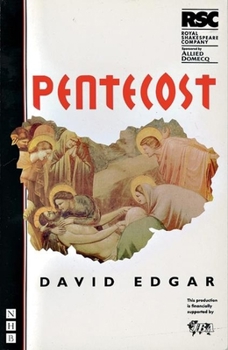Pentecost
The newest play by one of England's leading playwrights.
Format:Paperback
Language:English
ISBN:1854592920
ISBN13:9781854592927
Release Date:March 1996
Publisher:Nick Hern Books
Length:128 Pages
Weight:0.35 lbs.
Dimensions:0.4" x 5.1" x 7.8"
Customer Reviews
5 ratings
One of the best plays I have ever read
Published by Thriftbooks.com User , 15 years ago
I read this play in preparation for seeing it on stage in Stratford, Ontario in 2007, and once I began reading, I could not stop. In addition to its quality as a page-turner, Pentecost is incredibly thought provoking in the realms of Eastern European politics and the question of what role art plays in the world. Although it deals with a specific time, I think we'll find in the years to come that there are universal elements to Pentecost that will turn it into a classic. One note about production: the Stratford 2007 production seemed very tame compared to the way the script read. There is an ititial scene with a prostitute in the church that I had thought would be very explicit, but everything was staged in the dark and the whole point of the scene was that our art historian protagonist prevents anything from happening. Before the intermission, the hostages and their captors exchange clothes, which I thought would be an occasion of gratuitous nudity, but as everyone has their underclothes on, it's no worse than, say, Noises Off. Finally, towards the end of the second act there's a priest who is forced to walk into the church naked as a way of humiliating the outside world- this too was brief, and as the priest covered himself with the papers he was carrying until a coat was brought for him, the production managed to be PG-13 at a festival that has not shied away from full frontal male and female nudity when required by the text. Personally, I found no shock value in the production and heard no gasps from the audience, who were entranced by the play.
Only the worst play for the closed-minded
Published by Thriftbooks.com User , 19 years ago
If you fear change and provocative discussion, don't read or see this play. If you appreciate the struggle of people on the other side of the world, if you want to listen to an intelligent critique on society, and if you want to enjoy an brilliantly crafted fiction, read it. And see it if it's playing near you. I don't know what that guy who wrote that it's "the worst play ever" was thinking, but it's pretty evident that he doesn't think very broadly. Theatre for entertainment is all well and good, but anyone who thinks it can't also be a vessel for social change is a fool, and people who bash things they don't agree with clearly demonstrate themselves as such. So read this play, and regardless of whether you love it or loathe it, TALK about it. I think that's what the playwright wanted in the first place.
Take the time to appreciate this play.
Published by Thriftbooks.com User , 20 years ago
Firstly, let me dispell the comment below about gratuitous [physical] sex: there is no sex in this play, and only a brief nude scene which is completely unsexual. My college just performed this great play, and it took a while to warm up to it. The first time I tried reading the script, I had an extremely hard time getting through it. If David Edgar is guilty of one bad thing in this play, it is for dealing with too many issues and ideas. This work is jam-packed with ideas--not randomely, but ideas brought forth by characters who fittingly have them and feel the need to share them. There is a great line in the play: "we are the sum of those who have invaded us." Let this play invade you.
Great in class discussions.
Published by Thriftbooks.com User , 21 years ago
I have used this play in several undergraduate classes in European Politics. One of its many virtues is that it starts a lot of conversations with students who by their own admission know very little about eastern europe. And yet whenever I have students from eastern europe in the class, they always find many parts of the play deeply authentic. It's getting a bit dated by now (2003), but I still think it's a terrific starting point for discussions about borders, ethnicity, and commerce in contemporary europe.
Colorful and bound breaking
Published by Thriftbooks.com User , 22 years ago
This play reads into the structure of language barriers and breaks into the strife between the eastern and western hemispheres. Though the bracketed english is a bit confusing at times, the play itself is easy to get involved in. It is based around the mystery of who painted a mystery fresco inside of a small church. As the mystery unfolds, so do the characters. The plot keeps the reader inthraled and wondering who will be the greedy one. I recommend this book to all theater majors because of its use of structure and role reversals. It really lends a hand to those looking for a piece about the barriers and definitions between cultures.





